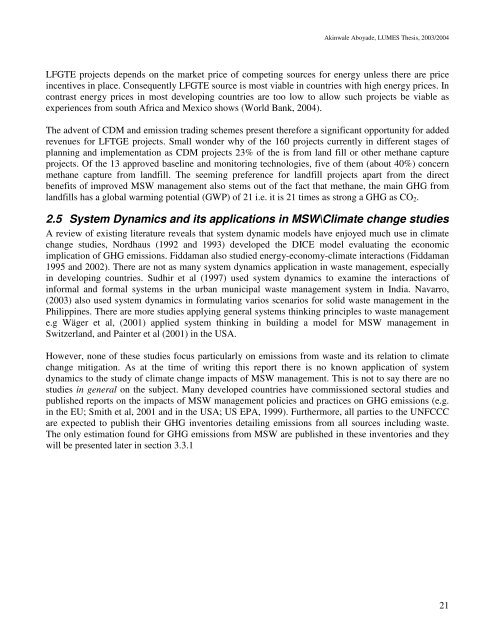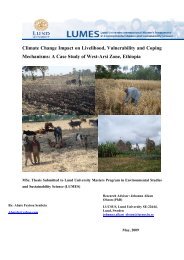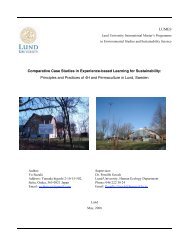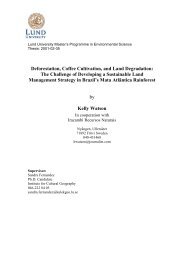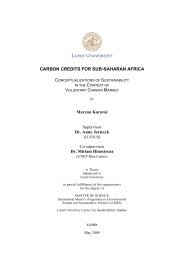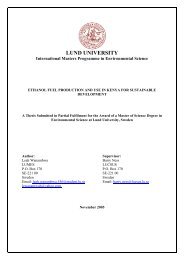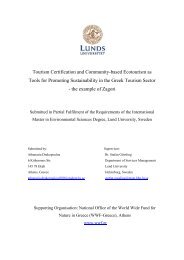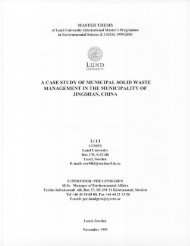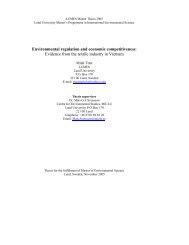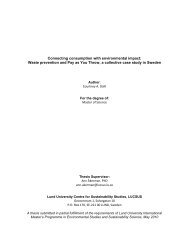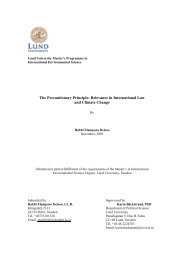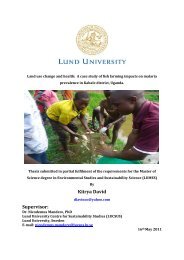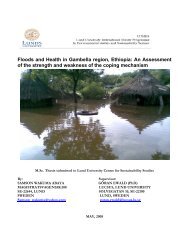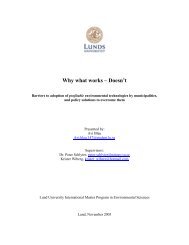Wale Aboyade's thesis - lumes
Wale Aboyade's thesis - lumes
Wale Aboyade's thesis - lumes
You also want an ePaper? Increase the reach of your titles
YUMPU automatically turns print PDFs into web optimized ePapers that Google loves.
Akinwale Aboyade, LUMES Thesis, 2003/2004<br />
LFGTE projects depends on the market price of competing sources for energy unless there are price<br />
incentives in place. Consequently LFGTE source is most viable in countries with high energy prices. In<br />
contrast energy prices in most developing countries are too low to allow such projects be viable as<br />
experiences from south Africa and Mexico shows (World Bank, 2004).<br />
The advent of CDM and emission trading schemes present therefore a significant opportunity for added<br />
revenues for LFTGE projects. Small wonder why of the 160 projects currently in different stages of<br />
planning and implementation as CDM projects 23% of the is from land fill or other methane capture<br />
projects. Of the 13 approved baseline and monitoring technologies, five of them (about 40%) concern<br />
methane capture from landfill. The seeming preference for landfill projects apart from the direct<br />
benefits of improved MSW management also stems out of the fact that methane, the main GHG from<br />
landfills has a global warming potential (GWP) of 21 i.e. it is 21 times as strong a GHG as CO 2 .<br />
2.5 System Dynamics and its applications in MSW\Climate change studies<br />
A review of existing literature reveals that system dynamic models have enjoyed much use in climate<br />
change studies, Nordhaus (1992 and 1993) developed the DICE model evaluating the economic<br />
implication of GHG emissions. Fiddaman also studied energy-economy-climate interactions (Fiddaman<br />
1995 and 2002). There are not as many system dynamics application in waste management, especially<br />
in developing countries. Sudhir et al (1997) used system dynamics to examine the interactions of<br />
informal and formal systems in the urban municipal waste management system in India. Navarro,<br />
(2003) also used system dynamics in formulating varios scenarios for solid waste management in the<br />
Philippines. There are more studies applying general systems thinking principles to waste management<br />
e.g Wäger et al, (2001) applied system thinking in building a model for MSW management in<br />
Switzerland, and Painter et al (2001) in the USA.<br />
However, none of these studies focus particularly on emissions from waste and its relation to climate<br />
change mitigation. As at the time of writing this report there is no known application of system<br />
dynamics to the study of climate change impacts of MSW management. This is not to say there are no<br />
studies in general on the subject. Many developed countries have commissioned sectoral studies and<br />
published reports on the impacts of MSW management policies and practices on GHG emissions (e.g.<br />
in the EU; Smith et al, 2001 and in the USA; US EPA, 1999). Furthermore, all parties to the UNFCCC<br />
are expected to publish their GHG inventories detailing emissions from all sources including waste.<br />
The only estimation found for GHG emissions from MSW are published in these inventories and they<br />
will be presented later in section 3.3.1<br />
21


